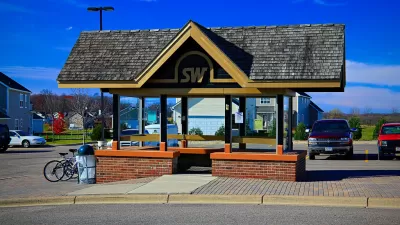Just how does a transportation bill that doesn't increase fuel taxes or introduce new user charges, and maintain the same level of spending reduce the deficit by $16.3 billion? Ask the Congressional Budget Office.
Rather than a straightforward gas tax increase to sustain the current level of transportation spending, the bill, known as H.R. 4348 or MAP-21, relies on an incredible amount of budget transfers and redirecting of funds from different revenue sources which may or may not have to do with transportation. Conclusion: "CBO estimates that enacting H.R. 4348 would reduce budget deficits over the 2012-2022 period by $16.3 billion."
According to Taxpayers For Common Sense (TCS), "the $16.3 billion includes $11.2 billion in increased premiums from the Pension Benefit Guaranty Corporation – which is itself $26 billion in debt!" And then one one must disregard the "$18.8 billion transfer from the Treasury to the Highway Trust Fund! Or the transfer of $2.4 billion from the Leaking Underground Storage Tank (LUST) Fund to the Highway Trust Fund!"
When TCS does the math for the new bill, they conclude that it will increase the deficit by 13.7 billion.
In their Statement Opposing Transportation Omnibus Bill, TCS accuses lawmakers of relying "on a variety of budgetary smoke and mirrors."
According to TCS, the revenue gained from changes in the Pension Benefit Guaranty Corporation are "ludicrous at best." But even if the new revenue is correctly determined, why is it directed to the Highway Trust Fund that historically has been funded from highway user fees to pay for the nation's transportation needs?
Thanks to Deron Lovaas
FULL STORY: Congress’ Tortured Math

Alabama: Trump Terminates Settlements for Black Communities Harmed By Raw Sewage
Trump deemed the landmark civil rights agreement “illegal DEI and environmental justice policy.”

Study: Maui’s Plan to Convert Vacation Rentals to Long-Term Housing Could Cause Nearly $1 Billion Economic Loss
The plan would reduce visitor accommodation by 25% resulting in 1,900 jobs lost.

Planetizen Federal Action Tracker
A weekly monitor of how Trump’s orders and actions are impacting planners and planning in America.

Study Links Covid and Poor Driving
The effects of the virus, including ‘brain fog,’ can make driving more difficult and dangerous.

Waymo Gets Permission to Map SF’s Market Street
If allowed to operate on the traffic-restricted street, Waymo’s autonomous taxis would have a leg up over ride-hailing competitors — and counter the city’s efforts to grow bike and pedestrian on the thoroughfare.

Parklet Symposium Highlights the Success of Shared Spaces
Parklets got a boost during the Covid-19 pandemic, when the concept was translated to outdoor dining programs that offered restaurants a lifeline during the shutdown.
Urban Design for Planners 1: Software Tools
This six-course series explores essential urban design concepts using open source software and equips planners with the tools they need to participate fully in the urban design process.
Planning for Universal Design
Learn the tools for implementing Universal Design in planning regulations.
Caltrans
Smith Gee Studio
Institute for Housing and Urban Development Studies (IHS)
City of Grandview
Harvard GSD Executive Education
Toledo-Lucas County Plan Commissions
Salt Lake City
NYU Wagner Graduate School of Public Service



























